Search Thermo Fisher Scientific
Invitrogen
Phospho-eIF4E (Ser209) Polyclonal Antibody
This Antibody was verified by Cell treatment to ensure that the antibody binds to the antigen stated.
FIGURE: 1 / 7
Phospho-eIF4E (Ser209) Antibody (44-528G) in ICC/IF
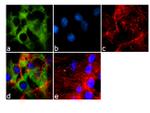
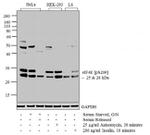
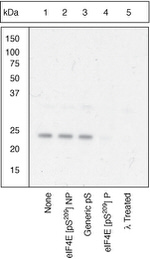
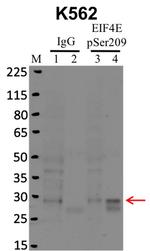
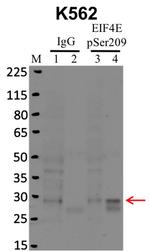
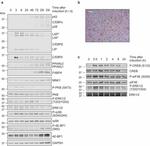
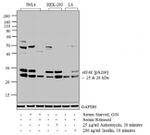
Product Details
44-528G
Species Reactivity
Published species
Host/Isotype
Class
Type
Immunogen
Conjugate
Form
Purification
Storage buffer
Contains
Storage conditions
Shipping conditions
RRID
Target Information
eIF4E is involved in several cellular processes including enhanced translational efficiency, splicing, mRNA stability, and RNA nuclear export. All eukaryotic cellular mRNAs are blocked at their 5-prime ends with the 7-methylguanosine cap structure, m7GpppX (where X is any nucleotide). EIF4E is a eukaryotic translation initiation factor involved in directing ribosomes to the cap structure of mRNAs. It is a 24-kD polypeptide that exists as both a free form and as part of a multiprotein complex termed EIF4F. The EIF4E polypeptide is the rate-limiting component of the eukaryotic translation apparatus and is involved in the mRNA-ribosome binding step of eukaryotic protein synthesis. The other subunits of EIF4F are a 50-kD polypeptide, termed EIF4A, that possesses ATPase and RNA helicase activities, and a 220-kD polypeptide, EIF4G.
For Research Use Only. Not for use in diagnostic procedures. Not for resale without express authorization.
Bioinformatics
Protein Aliases: eIF-4E; eIF-4F 25 kDa subunit; Eukaryotic translation initiation factor 4E; eukaryotic translation initiation factor 4E-like 1; MGC111573; mRNA cap-binding protein; OTTHUMP00000219703; OTTHUMP00000219704; OTTHUMP00000219705
Gene Aliases: AUTS19; CBP; EG668879; EIF-4E; EIF4E; Eif4e-ps; EIF4E1; EIF4EL1; EIF4F; If4e
UniProt ID: (Human) P06730, (Rabbit) P29338, (Mouse) P63073, (Rat) P63074
Entrez Gene ID: (Human) 1977, (Rabbit) 100009338, (Mouse) 13684, (Rat) 117045

Performance Guarantee
If an Invitrogen™ antibody doesn't perform as described on our website or datasheet,we'll replace the product at no cost to you, or provide you with a credit for a future purchase.*
Learn more
We're here to help
Get expert recommendations for common problems or connect directly with an on staff expert for technical assistance related to applications, equipment and general product use.
Contact tech support
